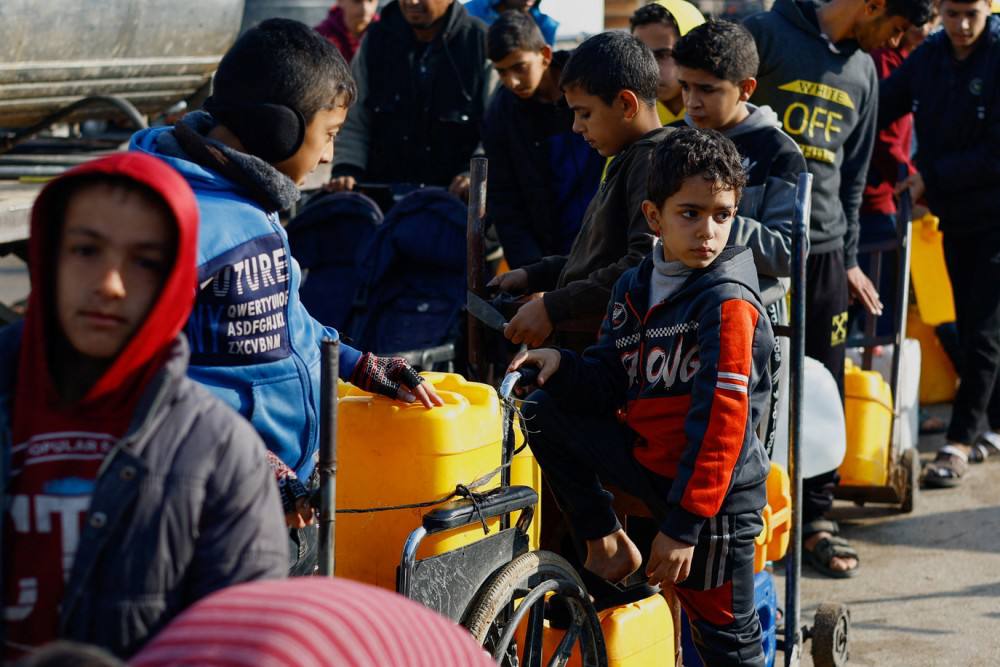In Gaza, there is no bread, only bullets.
Gaza uses hunger as a weapon.
Three months after the start of the conflict, while Israel ignores pressures to reduce violence, people in Gaza are dying of hunger. More than 23,000 Palestinians have lost their lives during this time.
Three months after the October 7th attack and the beginning of the humanitarian crisis in Gaza, warnings have escalated from all levels. In the besieged area, access to healthcare has become almost impossible. Over 90% of the population has been displaced, while aid and basic needs, including food, enter the region slowly.
International agencies have repeatedly warned that Gaza is dying of hunger. According to a United Nations report, one out of every four individuals dies of starvation, and in some areas, nine out of ten households have no access to food for prolonged periods and are without sustenance. A report from the World Food Programme (WFP) predicts that by February, the entire population of 2 million people residing in Gaza will face severe food insecurity, with at least one out of every four families experiencing conditions of hunger and famine.
Vulnerable individuals such as pregnant women and children are at a higher risk of malnutrition because there is a concerning shortage of infant formula. In addition, the delivery of humanitarian aid to the Gaza Strip has become extremely complicated and difficult due to the ongoing bombardments, resulting in limited assistance reaching those in need. According to the United Nations report, only 8% of the required food aid reached the intended recipients in the last week of December.
Caught between hunger and destruction
The humanitarian situation in Gaza is both heartbreaking and distressing. The Israeli bombardments have caused significant damage to bakeries, food warehouses, and the roads used for transporting humanitarian aid. Even if all of these are rebuilt, they will still face the serious problem of severe shortages of raw materials.
After the October 7 attack, Israeli Defense Minister Yuval Galant issued an order for the complete blockade of the Gaza Strip, stating that no electricity, food, or fuel will be provided in this area. Meanwhile, National Security Minister Itamar Ben Gvir announced on October 17 that no aid should enter Gaza until Hamas releases the hostages they have taken.
13 weeks after the start of the Operation Al-Aqsa Storm, several human rights groups and legal experts considered these statements, along with Israel’s actions to prevent access to water and food in Palestinian territory, as collective punishment against civilians and part of a strategy of food deprivation as a weapon of war. They regarded it as a clear violation of international laws and condemned it.
Reporters in Tiras
While the residents of the Gaza Strip fight to survive and the death toll surpasses 23,000, there are other aspects of the war news that are being circulated in social and traditional media. This pertains to the killing of a large number of journalists and media personnel since the start of the conflict between Hamas and Israel.
According to the Committee to Protect Journalists (CPJ), a total of 109 journalists have been killed in a span of 13 weeks. This unprecedented number surpasses the recorded casualties in any other war or conflict in modern times. In a press statement, the international organization emphasized that journalists are non-combatants who perform important work during crises and should not be targeted by warring parties.
The latest victims, in chronological order, were Hamza Alduhduh, a journalist and cameraman for Al Jazeera, Wael Alduhduh, the son of the head of Al Jazeera’s correspondence office, and Mustafa Tharia, an independent employee of the network. They were killed in an airstrike by unmanned aircraft in the southern Gaza Strip.
Despite Israel’s declaration of banning international media access, Al Jazeera, one of the few networks present in the Gaza Strip, has openly accused the Israeli government of targeting journalists in order to silence the information and news messengers and thus suppress evidence of the ongoing massacre of innocent civilians.
America’s Mission: Impossible
The current situation in Gaza can be summarized in one sentence: an unimaginable tragedy. Antony Blinken, the US Secretary of State, spoke about the death of Hamza al-Duhduh during an interview with reporters while on a mission in Doha, the capital of Qatar.
Blinken, referring to the fact that an Al Jazeera reporter had previously lost his wife in a bombing in December, said, ‘I am also a father, and I cannot imagine the horror and grief he has experienced, not just once but for the second time, losing a wife, a son, a daughter, and a nephew.’
However, despite all the details reported by the Arab media and despite the resistance from Netanyahu’s government against the US request for a humanitarian ceasefire to condemn Israel for the killing of a large number of civilians and journalists, it is no secret that Israel still enjoys full support from Washington, as they have never called for a permanent ceasefire.
However, the US Secretary of State, who has also traveled to the United Arab Emirates and Saudi Arabia, a trip that was not easy and comfortable, currently has the top priority and main goal for the US government, which is dealing with election struggles, to prevent the escalation of tensions and find a suitable solution for managing the Gaza Strip after the conflict ends. However, due to the high number of civilian casualties, which continues to increase without interruption, it is unacceptable for most Arab countries to hear this statement about priorities in the coming days.
The Washington Post revealed in a report that there is a belief and conviction in the White House that Benjamin Netanyahu, the Prime Minister of Israel, intends to expand the conflict to ensure his political survival and also to increase his popularity among the people if he wins. This goal, if confirmed based on evidence and also with the start of targeted killings in Lebanon, will pose the risk of turning Antony Blinken’s new trip into an impossible mission.
Three months after the start of the ongoing conflict, the international community is witnessing a tremendous humanitarian catastrophe in the Gaza Strip, with no end in sight. According to reports from human rights organizations, which continue their activities in Gaza despite significant challenges and limited resources, the number of Palestinian civilian casualties is alarmingly high and appears to be increasing.
The lack of security in the Gaza Strip makes it extremely difficult to distribute the limited aid that has reached the area to meet the immense needs of the exhausted and desperate population. Against this backdrop, it raises the question of what tangible and concrete results Anthony Blinken, the US Secretary of State, can bring home with him on his latest trip to Israel, where he declared the protection of non-combatant lives and increased assistance to the Gaza Strip as the top priorities of the US government.
Persian
مشاهده این مقاله به زبان فارسی


